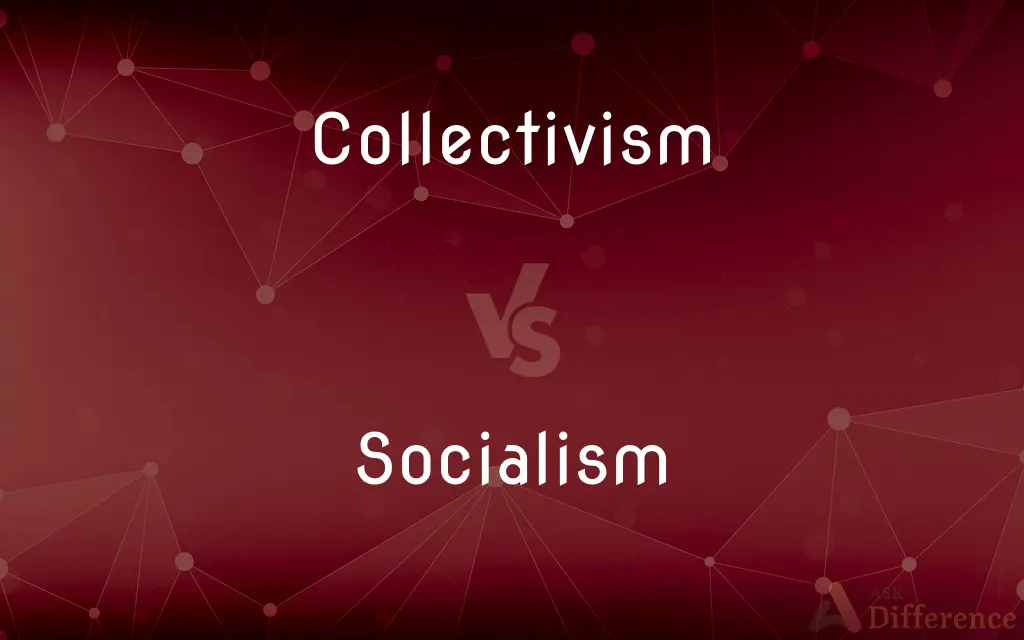Collectivism vs. Socialism — What's the Difference?

Difference Between Collectivism and Socialism
ADVERTISEMENT
Compare with Definitions
Collectivism
Collectivism is a value that is characterized by emphasis on cohesiveness among individuals and prioritization of the group over the self. Individuals or groups that subscribe to a collectivist worldview tend to find common values and goals as particularly salient and demonstrate greater orientation toward in-group than toward out-group.
Socialism
Socialism is a political, social, and economic philosophy encompassing a range of economic and social systems characterised by social ownership of the means of production. It includes the political theories and movements associated with such systems.
Collectivism
The principles or system of ownership and control of the means of production and distribution by the people collectively, usually under the supervision of a government.
Socialism
Any of various theories or systems of social organization in which the means of producing and distributing goods is owned collectively or by a centralized government that often plans and controls the economy.
Collectivism
An economic system in which the means of production and distribution are owned and controlled by the people collectively
ADVERTISEMENT
Socialism
The stage in Marxist-Leninist theory intermediate between capitalism and communism, in which the means of production are collectively owned but a completely classless society has not yet been achieved.
Collectivism
The practice or principle of giving a group priority over each individual in it.
Socialism
Any of various economic and political theories advocating collective or governmental ownership and administration of the means of production and distribution of goods.
Collectivism
The doctrine that land and capital should be owned by society collectively or as a whole; communism.
Socialism
A system of social and economic equality in which there is no private property.
Collectivism
Soviet communism
Socialism
A system or condition of society in which the means of production are owned and controlled by the state.
Collectivism
A political theory that the people should own the means of production
Socialism
(Marxism-Leninism) The intermediate phase of social development between capitalism and communism in Marxist theory in which the state has control of the means of production.
Socialism
Any of a group of later political philosophies such democratic socialism and social democracy which do not envisage the need for full state ownership of the means of production nor transition to full communism, and which are typically based on principles of community decision making, social equality and the avoidance of economic and social exclusion, with economic policy giving first preference to community goals over individual ones.
Socialism
Any left-wing ideology, government regulations, or policies promoting a welfare state, nationalisation, etc.
Socialism
A theory or system of social reform which contemplates a complete reconstruction of society, with a more just and equitable distribution of property and labor. In popular usage, the term is often employed to indicate any lawless, revolutionary social scheme. See Communism, Fourierism, Saint-Simonianism, forms of socialism.
[Socialism] was first applied in England to Owen's theory of social reconstruction, and in France to those also of St. Simon and Fourier . . . The word, however, is used with a great variety of meaning, . . . even by economists and learned critics. The general tendency is to regard as socialistic any interference undertaken by society on behalf of the poor, . . . radical social reform which disturbs the present system of private property . . . The tendency of the present socialism is more and more to ally itself with the most advanced democracy.
We certainly want a true history of socialism, meaning by that a history of every systematic attempt to provide a new social existence for the mass of the workers.
Socialism
A political theory advocating state ownership of industry
Socialism
An economic system based on state ownership of capital
Share Your Discovery

Previous Comparison
Infamy vs. Notoriety
Next Comparison
Genitive vs. Dative













































